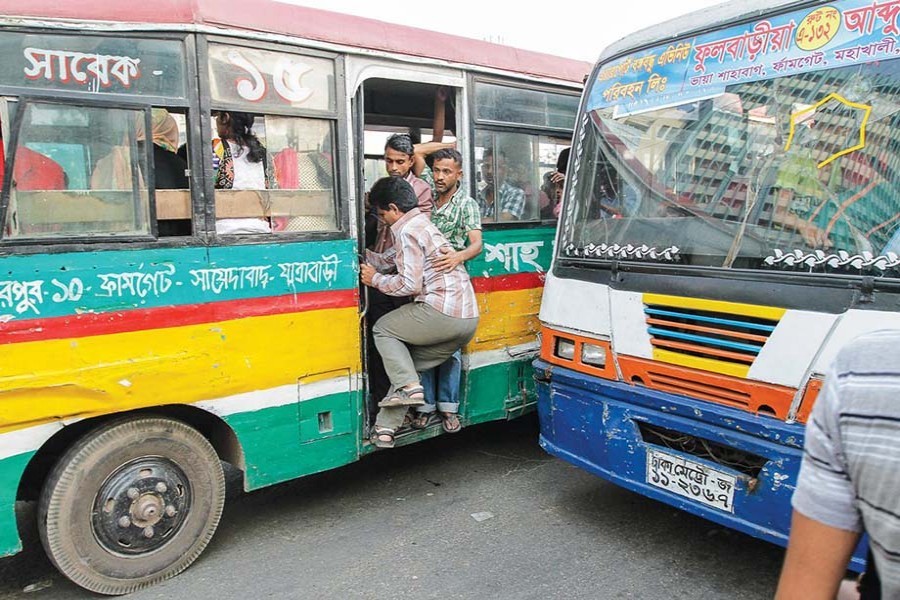Notwithstanding the recent campaigns by law enforcers to bring discipline to the country's roads and highways, little improvement in the scenario could be noticed. To speak pithily, there have been no changes in the anarchic traffic movement which prevailed earlier. The roads continue to be haunted by deaths and injuries, with all modes of transport apparently letting be drawn to an abysmal condition. Rays of even faint hopes, which have been discerned lately, appear to have vanished --- at least for now. Distressing thoughts have started galling the nation: Is there no way out from this dreadful nightmare? Or is the country doomed to remain stuck in this pervasive traffic chaos? To the edgy sections of the people, the upbeat feeling, raised a few months back, seems to have been replaced by misgivings.
There are cogent reasons on the part of many people for adopting such a cynical attitude. In the last couple of months lives of hundreds of transport passengers, pedestrians and other people were cut short. Accidents now rule the roost in the country's roads and highways. Many mishaps finally emerged as heart-rending tragedies. The victims belonged to all ages, and they were both males and females. They included adult persons, babies and adolescents, students, teachers, businesspersons and office-goers along with people engaged in myriad types of profession. Deaths of males, who were lone bread earners of their families, migrant young employees coming home with their heard-earned money, travelling wedding processions, or entire families for that matter, have long become hard to bear with anymore. These fatalities are occurring throughout the country, the big cities in the main, and the capital in particular. Travel on highways is now virtually like keeping oneself before the jaws of death during the whole journey time. Head-on collisions, buses or trucks skidding off into water bodies along the roads, speeding vehicles crashing into roadside business establishments or improvised tents of sleeping day-labourers are now common spectacles. Hardly does a day pass on which news of fatal road accidents are not published or broadcast in the media. The phenomenon has come to such a pass that people in the country have largely become inured to road mishap fatalities.
According to a report, around 6 thousand and 5 hundred people lost their lives in different road accidents in the country in the last two years. The country has witnessed few bouts of accidents in the recent years on the scale of this enormity. But given the stuck-in nature of their recurrence, Bangladesh is virtually passing through a painful phase of nonchalance. The grave nature of the present road chaos in the country has been elucidated by no less a person than Obaidul Quader --- the Road Transport and Bridges Minister. At a recent press conference at his office the minister has veritably thrown in the towel as he confessed that discipline had not returned to the country's roads. The frequency of road accidents and tailbacks had been on the rise due to this, he added. The minister pointed the finger at the plying of slow-moving illegal vehicles on the highways for the anarchic situation. He held a section of political leaders for this turn of things. The helplessness of the Road Transport Minister assumes special significance thanks to his expected critical role in streamlining the traffic movement across the country. The minister heads the National Council for Road Security. He is also the chief of the national advisory body for road security. The latter is tasked with giving advices on bringing discipline to the roads. The minister's helplessness, presumably tinged with prick of conscience, is understood. But it may be irrational to vest in him alone the responsibility to bring order to the roads and highways. It's because a lot of other agencies are entrusted with responsibilities to keep transport movement hazard-free. The prime responsibility, however, lies with the road users.
It's worth remembering that the special programmes on ensuring traffic discipline follow a countrywide student movement after the deaths of two college students in Dhaka. The agitating students have emphatically focused on a few basic demands related to safe roads. They called for a complete stop to the vehicle drivers' recklessness, firmly dealing with different irregularities, stringent enforcement of traffic laws along with other measures. To the disillusionment of the people in general, the road scenario reverted to its old dismal look after a brief spell. Yet during the short interregnum the country's roads demonstrated that they had also the capability to live up to the people's expectation. But the ingrained flaws in the overall running of the sector continue to raise their ugly heads. It is these impediments which repeatedly come up as a stumbling block to occasional efforts to solve the festering problems.
Seminars, roundtables etc on the country's roads and highways continue to be held in the capital. Along with conventional suggestions, those based on radical concepts and grand visions find place in these colloquiums. But these are consigned to the backburner after the meets' end. The conscious segments have been witnessing these rituals year in and year out. The whole traffic world of the country is, apparently, on the verge of entering a new chapter. From multi-lane highways, flyovers to metro-rail routes to bus rapid transit, scores of transport means have been in place or are in the pipeline. The death-haunted condition of the transport sector will one day be a thing of the past. But who'll take the responsibility of helping the road users overcome the ordeals of the transitional period? No definite answer seems forthcoming.


